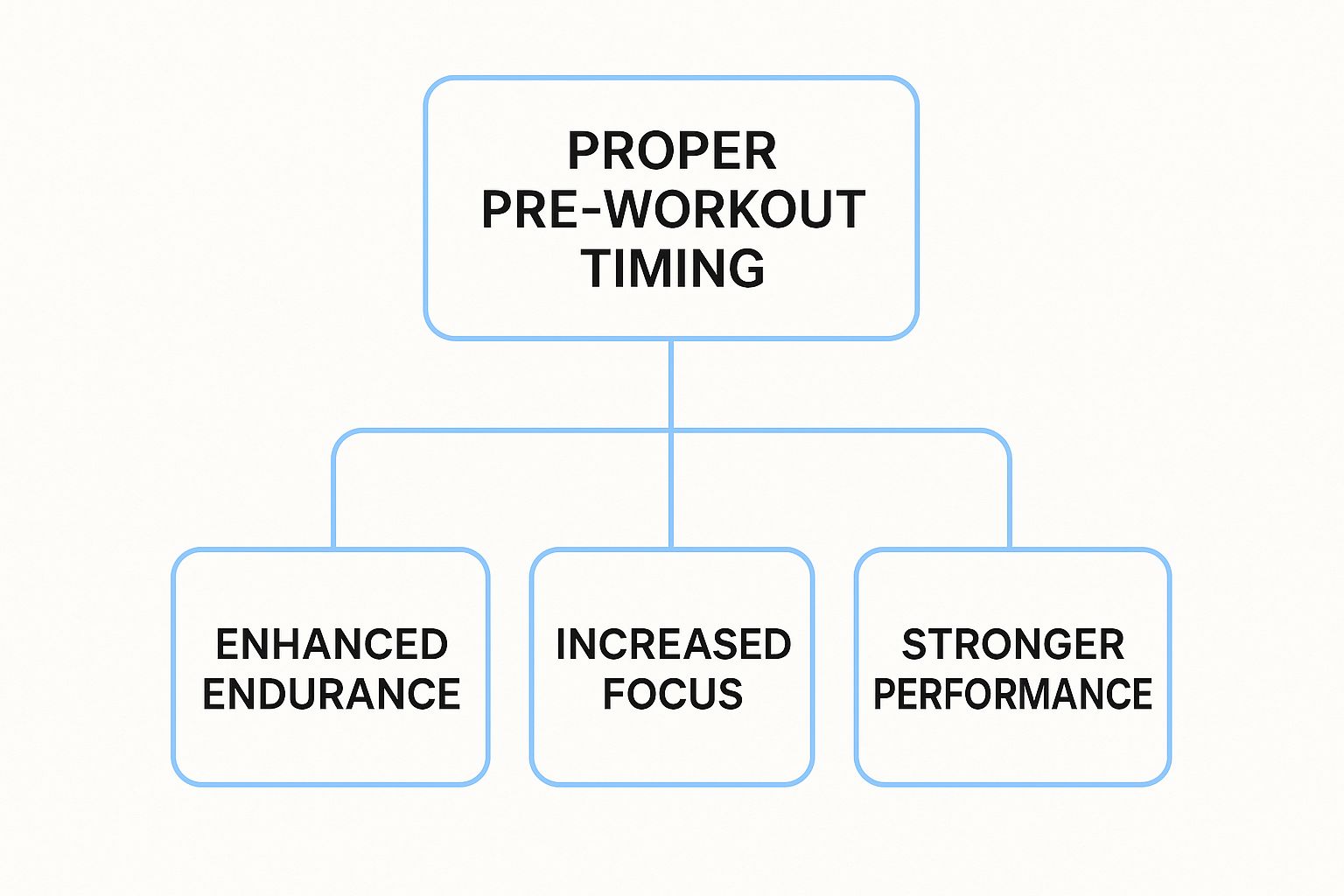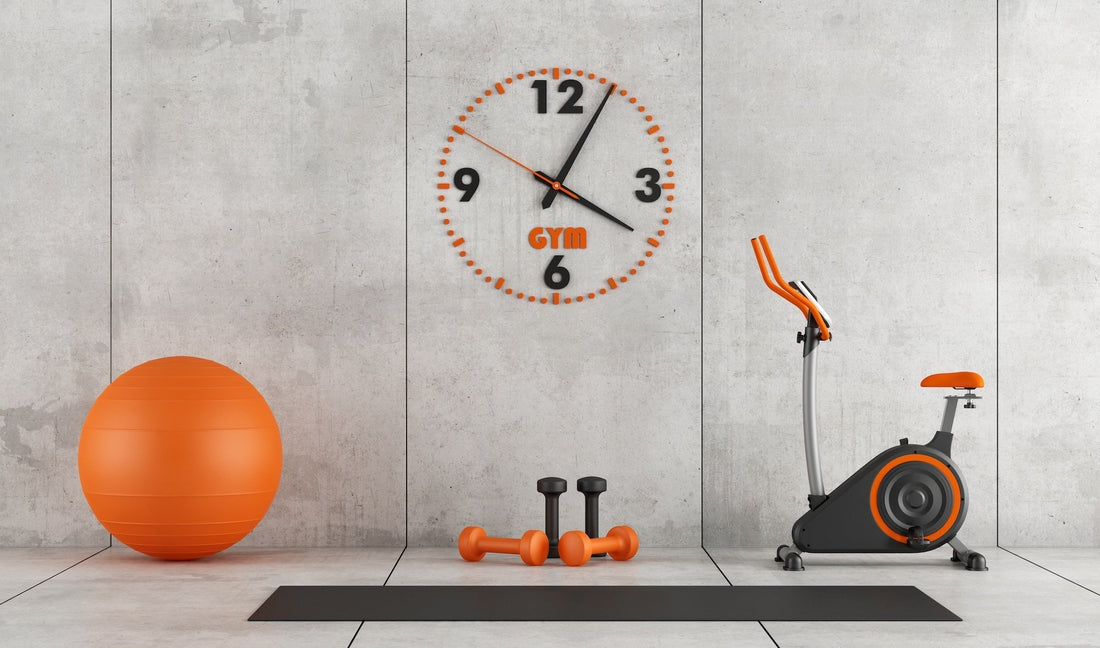For the biggest impact, the sweet spot for taking your pre-workout supplement is about 20 to 30 minutes before you start training. This simple guideline gives your body just enough time to absorb the key ingredients and have them firing on all cylinders right when you need them most.
The Golden Window for Pre Workout Timing
Think of your pre-workout timing as the essential prep phase before a big lift. You wouldn't skip your warm-up; in the same way, you need to prepare your body internally to unleash your full potential. That 20 to 30-minute period is your "golden window."
It’s the time your body needs to properly digest the supplement and shuttle those powerhouse ingredients into your bloodstream.
This timing is everything for a few critical reasons:
- Peak Ingredient Activation: It gives active ingredients, especially stimulants like caffeine, enough time to hit their maximum effectiveness just as your workout kicks off.
- Mental Focus: Nootropics in the formula get a chance to sharpen your mind-muscle connection, ensuring you're completely locked in from the very first rep.
- Energy on Demand: Your body is primed and ready to tap into that energy surge, preventing you from feeling sluggish or flat during your warm-up.
For a clearer picture, here’s a quick breakdown of why this timing works so well.
Quick Guide to Pre Workout Timing
| Time Before Workout | Expected Effect | Primary Reason |
|---|---|---|
| 20-30 Minutes | Optimal energy, focus, and pump | Allows key ingredients to reach peak concentration in your bloodstream. |
| Less than 15 Minutes | Diminished or delayed effects | Your body hasn't had enough time to fully absorb the compounds. |
| More than 45 Minutes | You might feel the peak too early | Stimulants and other ingredients may start to wear off mid-workout. |
Getting this right means you feel the kick just as you're starting, not halfway through or after you're already done.
This timing syncs up perfectly with the science of common ingredients like caffeine, which typically reaches its peak concentration in your blood around 30 to 60 minutes after you drink it.
Nailing this is a fundamental first step, especially if you're new to supplements. To build a solid foundation from the start, check out our complete guide on pre-workout for beginners.
By respecting this window, you're setting the stage for a legendary training session every single time.
How Ingredients Affect Your Pre Workout Timing
Not all pre-workouts are built the same, and the specific formula in your tub is what really dictates the perfect timing. Think of it like a well-designed training program—each component serves a specific purpose at a specific time. Getting to know the ingredients in your supplement is the key to unlocking its full power.
The most common ingredient, caffeine, is your frontline heavy hitter. It needs about 30 minutes to fully kick in, delivering that critical energy surge and mental clarity just as you get into the meat of your workout. This is exactly why the 20-30 minute window is so popular.
Then you have Beta-Alanine, the ingredient responsible for that tingle (paresthesia). It also works best when taken in that same timeframe. Its job is to help buffer lactic acid, which lets you grind out those last few reps where the real growth happens.
This infographic breaks down how nailing your timing unlocks the benefits you're really after.

As you can see, timing isn't just a suggestion; it directly connects to better endurance, sharper focus, and stronger overall performance.
Cumulative vs. Immediate Effects
Now, not every ingredient gives you an instant power-up. Some, like Creatine, are playing the long game.
Creatine works cumulatively. Its strength builds up in your muscles over days and weeks. While taking it pre-workout is convenient, its immediate timing isn't nearly as critical as just taking it consistently every single day.
Other key players you'll find in pre-workout formulas include:
- L-Citrulline: This amino acid revs up nitric oxide production, which means better blood flow to your muscles and a much better "pump." It usually takes about 30-60 minutes to hit peak levels, fitting perfectly within that standard pre-workout window.
- BCAAs (Branched-Chain Amino Acids): Often thrown in to help reduce muscle soreness and fight off fatigue, BCAAs work best when they're already in your system during your workout.
By taking a quick look at your product's label and understanding what these core ingredients do, you can finally move past a generic, one-size-fits-all approach. You'll learn to time your scoop with precision, making sure every component activates exactly when you need it to crush your session.
Matching Your Timing to Your Training Goals
What's your mission for today's workout? The answer should drive exactly when you take your pre-workout. This isn't a one-size-fits-all game; it's a strategic move to line up your energy peak with your performance goals.

Think of it like choosing the right gear for a specific lift. You wouldn't wear squat shoes to go for a run, right? In the same way, your timing has to match what your workout demands.
If you're chasing a new personal best on your deadlift, you want every ounce of power hitting right as you grip the bar. That means timing your pre-workout perfectly to unleash explosive strength for maximum force.
But if you're gearing up for a long run, the goal is totally different. You need a steady, sustained release of energy to avoid hitting a wall, not a short, intense blast.
Tailoring Timing for Different Workouts
To truly get the most out of your session, you need to think about how your training style affects your energy needs. Each discipline benefits from a slightly different approach, and you can explore some of the best pre-workout supplements built for these varied goals.
-
Strength Training & Powerlifting: Take your pre-workout 20-30 minutes before you start lifting. This timing ensures ingredients like caffeine are peaking right when you're under the bar for your heaviest compound lifts, giving you that laser focus and raw power.
-
Endurance Cardio: For long runs or cycling sessions, aim for 30-40 minutes beforehand. This gives your body a little more time to absorb everything, creating a smoother, more sustained energy curve to help you fight off fatigue for the long haul.
-
High-Intensity Interval Training (HIIT): Stick to the classic 20-minute window. HIIT demands explosive energy from the very first second. Take it too early, and you might peak before you even hit the toughest part of the workout.
By dialing in your pre-workout schedule, you're directly supporting your performance and making sure you have the right kind of energy when it counts.
The Impact of Food on Your Pre Workout
What you eat—and when you eat it—can completely change how your pre-workout hits. Think of it like this: chugging your pre-workout right after a huge meal is like trying to merge onto a highway during rush hour. Everything just gets stuck.
Your body is busy digesting all that food, which means the key ingredients in your pre-workout have to wait in line. This traffic jam slows down their absorption, delaying or even weakening that energy boost you were counting on.
It's a frustrating spot to be in—you might not feel the full kick until your workout is almost over. But going in on a completely empty stomach isn't always the magic bullet, either.
Taking a high-stimulant formula without any food can sometimes feel like too much, too soon. For some people, this can lead to jitters or an upset stomach, which is the last thing you want mid-set. It’s all about finding that sweet spot.
The goal is simple: fuel your body without getting in the way of your supplement. Nail the timing, and you’ll get a clean, powerful energy boost without any unwanted side effects.
Finding Your Pre-Workout Meal Window
To sidestep these common problems, you just need to be a little strategic with your timing. This isn't about overhauling your diet; it's just about giving your body enough time to digest. A clear path for your pre-workout means a better workout for you.
Here are a few simple guidelines to get it right:
- After a Full Meal: Just finished lunch or dinner? Give it at least 90 minutes before you mix up your pre-workout. This gives your stomach plenty of time to process the food so nothing holds back your supps.
- After a Light Snack: If you just had something small like a banana or a protein bar, you don't need to wait as long. A 30-45 minute window is usually perfect.
- Fasted Training: For those who hit the gym first thing on an empty stomach, it’s a good idea to test the waters. Start with a half-scoop to see how you feel. This lets you get the benefits without feeling overwhelmed by the stimulants.
By following these rules of thumb, you can make sure your food and your pre-workout are working together, not against each other. It’s a small adjustment that makes a massive difference, ensuring your pre-workout kicks in exactly when you need it to.
Common Pre Workout Timing Mistakes to Avoid
Getting your pre-workout timing wrong can absolutely tank your session before you even start. It's an easy mistake to make, but a few simple adjustments can mean the difference between a new PR and a frustrating workout. Two classic errors can drain your energy right when you need it most.
The first major mistake? Taking it way too early. You might feel that incredible surge of energy while you're still changing or scrolling through your workout playlist, only to feel flat and drained by the time you get to your heavy lifts. That’s a classic rookie move that leaves a ton of potential on the table.
The Late-Night Workout Trap
The second big fumble is taking your pre-workout too late, especially if you train in the evening. Chugging a high-stimulant formula at 8 PM is basically a recipe for disaster. Sure, you might have an amazing workout, but the caffeine will still be coursing through your veins when you’re trying to sleep, leaving you staring at the ceiling for hours.
Quality sleep is non-negotiable for muscle recovery and growth. Sacrificing it for a late-night energy boost is a terrible trade-off that will sabotage your long-term progress.
Ignoring how long stimulants stay in your system just sets you up for restless nights and groggy mornings.
To sidestep this and other issues, just follow these simple rules:
- Avoid Taking It Too Soon: Don't down your pre-workout in the car if you have a long commute. A good rule of thumb is to drink it about 20-30 minutes before you start your first real working set.
- Set a Caffeine Curfew: As a general guideline, try to avoid taking any stimulant-based pre-workouts within 6-8 hours of when you plan to go to bed. This will help protect your sleep.
- Listen to Your Body: Pay close attention to how you feel. If you’re constantly feeling jittery or crashing hard, your timing is probably off. Understanding potential pre-workout side effects can help you figure out what’s going on and fix it fast.
Nailing these simple timing corrections will make a huge difference not just in your performance, but in your recovery and overall well-being, too.
Got Questions About Pre-Workout Timing? We've Got Answers.
Dialing in your pre-workout timing is a game-changer, but it's natural to have a few questions. Getting it right is the key to unlocking your potential, so let's clear up some of the most common things we hear.
How Long Does a Pre-Workout Actually Last?
So you've slammed your shaker cup. How long is this ride going to last? Generally, you’ll feel the full, peak power of a pre-workout for 1.5 to 2.5 hours.
The total effect, however, can linger for anywhere from 3 to 6 hours, which really comes down to the specific ingredients and how fast your own body metabolizes everything.
That initial wave of energy and focus is mostly from quick-hitting stimulants like caffeine. As your body works through them, that feeling will slowly fade. This is exactly why timing is so important—you want that peak hitting when you're under the bar for your heaviest set, not when you're stuck in traffic on the way home.
Should I Take Pre-Workout Before Cardio or Weights?
This one’s simple: it all comes down to what you’re prioritizing for that day's session. Ask yourself which part of your workout is going to demand the most from you.
- Before Weights: If you’re chasing strength and power, take your pre-workout 20-30 minutes before you start lifting. This gets your energy, focus, and blood flow firing on all cylinders right when you need it for big compound lifts. You'll move more weight and trigger more growth.
- Before Cardio: If today is all about endurance, taking it before your run or cycle can help you push past fatigue and hold a stronger pace. But a quick heads-up: if you're just doing a light 10-minute cardio warm-up before hitting the weights, hold off. Save the pre-workout for just before the iron awaits.
Here's the golden rule: Time your pre-workout so its peak effects slam right into the toughest part of your training. Fuel the part of your workout that matters most that day.
Can I Take Pre-Workout on My Rest Days?
Technically, sure, you can. But we really don't recommend it. Think of pre-workout as your ultimate tool for boosting physical performance. Using it on a rest day is unnecessary and counterproductive.
Taking a scoop on your off days can also accelerate your tolerance to key ingredients like caffeine. That means you’ll need more and more to get that same kick, making it less effective when you actually need to crush a workout. Keep your scoops for training days to maximize their impact and give your system a well-deserved break.
Ready to power up your next session with perfect timing? Otaku Pump delivers the energy you need to smash your goals. While inspired by anime culture, our focus is on high-quality fitness formulas. Check them out and find your perfect training partner at https://otakupump.com.




